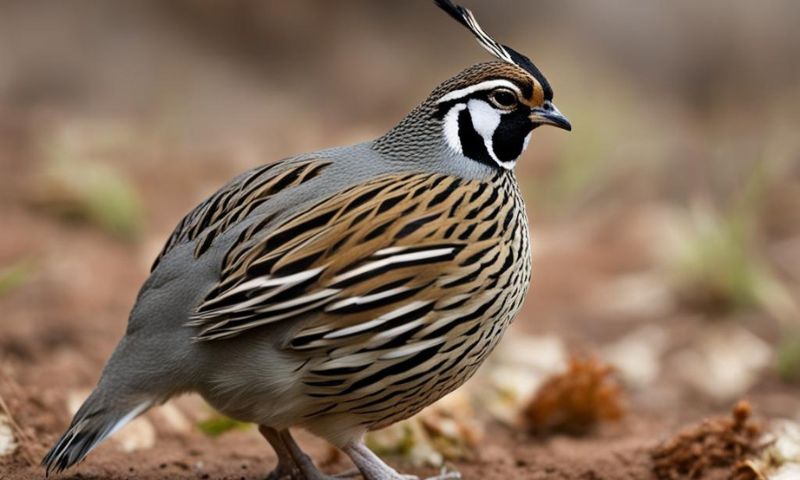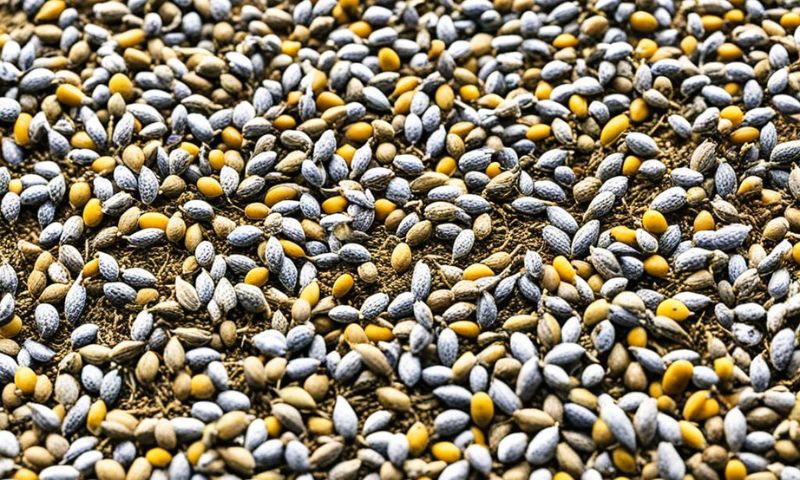How to Deal with Impacted Crops in Quails
Welcome to our comprehensive guide on dealing with impacted crops in quails! If you’re a quail enthusiast or a farmer, you may be aware of the potential damage that impacted crops can cause to these delicate birds. In this article, we will explore what impacted crops are and provide you with valuable insights on identifying, managing, and promoting the overall health of your quails’ crops.
Impacted crops occur when the crop, a specialized part of a bird’s digestive system, becomes blocked or slowed down, leading to a variety of digestive issues. This can happen due to factors such as overeating, consuming inappropriate food, or ingesting indigestible materials. Such crop damage in quails can significantly impact their well-being and productivity within an aviary setting.
It is crucial to be able to recognize the signs of impacted crops in quails to ensure timely intervention and prevent further complications. In the next section, we will discuss how to identify these issues and the common symptoms associated with crop-related problems in quails.
Identifying Impacted Crops in Quails
When it comes to the health and well-being of our quails, understanding and identifying impacted crops is crucial. Impacted crops, which occur when the crop becomes injured or obstructed, can have detrimental effects on a quail’s digestive system and overall health. By recognizing the signs and symptoms of crop-related issues, we can take prompt action to address the problem and prevent further complications.
Signs and Symptoms of Crop-Related Issues
There are several common signs that indicate a quail may have an impacted crop. These include:
- Visible swelling or distension of the crop area
- Regurgitation or repetitive swallowing movements
- Loss of appetite or reduced feed intake
- Difficulty breathing or labored breathing
- Inactivity or lethargy
It’s important to note that these symptoms may also indicate other health issues in quails. Therefore, it’s crucial to consult a veterinarian for an accurate diagnosis.
Effects of Abnormal Crop Consumption
Abnormal crop consumption can have significant effects on a quail’s digestive system. When the crop becomes obstructed, it can cause discomfort, impede food passage, and lead to digestive disturbances. This can result in malnutrition, weight loss, and even death if left untreated.
Additionally, an injured or impacted crop can create opportunities for bacteria or fungal infections to develop, further compromising the quail’s health. Therefore, identifying and addressing impacted crops promptly is essential to ensure the well-being of our quails.

As responsible quail owners, it is our duty to monitor our birds closely for any signs of crop-related issues. By staying vigilant and seeking veterinary assistance when needed, we can protect our quails from the harmful effects of impacted crops and maintain their digestive health.
Managing Impacted Crops in Quails
When it comes to quail health, managing impacted crops is crucial. Crop impaction, which occurs when foreign objects or excessive feed accumulate in the crop, can lead to significant feeding problems for quails. These issues can adversely affect their overall well-being and productivity. In this section, we will explore effective strategies for managing impacted crops in quails.
Adjusting the Quail’s Diet
One of the key preventive measures for crop impaction in quails is adjusting their diet. It is important to provide a balanced and appropriate diet that promotes proper digestion. Consider incorporating a variety of grains, greens, and protein sources in their feed. This will help ensure that the quail’s digestive system functions optimally and reduces the risk of crop impaction.
Remedies and Treatments
In cases where quails develop impacted crops, it is essential to take prompt action to address the issue. Consulting a veterinarian experienced in avian health is highly recommended. They will be able to evaluate the severity of the crop impaction and provide suitable remedies and treatments. This may include medication to promote crop movement or, in severe cases, surgical intervention.
It is crucial to remember that self-treatment or delaying veterinary intervention can have serious consequences for the quail’s health. Timely professional advice is vital in managing impacted crops effectively.
Preventing Quail Feeding Problems
Prevention is always better than dealing with the consequences of crop impaction. Alongside adjusting their diet, it is important to monitor the quail’s feeding behavior and make sure they have access to clean and fresh water. Regularly inspecting the feed and providing appropriate feeding equipment, such as shallow dishes, can also help minimize the risk of quail feeding problems.
By implementing these management strategies, quail owners can significantly reduce the occurrence of crop impaction and create a healthier environment for their birds.
| Cause | Description |
|---|---|
| Overfeeding | Excessive consumption of feed, leading to crop overload |
| Poor Diet Composition | Lack of dietary variety and imbalanced nutrient content |
| Foreign Objects | Accidental ingestion of non-edible items, causing crop obstructions |
| Water Deprivation | Inadequate access to clean and fresh water, causing crop dryness |
Promoting Quail Crop Health
A healthy quail crop is essential for their overall well-being and to prevent the occurrence of quail gastrointestinal issues such as impacted crops. By maintaining a balanced diet and implementing preventive measures, you can ensure that your quail’s crop remains in optimal condition.
1. Balanced Diet:
Providing quails with a balanced diet is crucial for promoting their crop health. Incorporate a variety of grains, seeds, and high-quality commercial feeds to ensure they receive all the necessary nutrients. Avoid feeding them large amounts of hard, indigestible substances that could potentially lead to crop impaction.
2. Proper Hydration:
Hydration plays a vital role in maintaining quail crop health. Ensure that fresh and clean water is available at all times. Proper hydration reduces the risk of crop obstruction and facilitates smooth digestion.
3. Regular Crop Examination:
Regularly examine your quail’s crop for any signs of abnormalities or impaction. Gently palpate the area to feel for any hard masses or unusual textures. If you notice any irregularities, consult with a veterinarian for proper diagnosis and treatment.
4. Environmental Factors:
Consider the environmental factors that may potentially impact your quail’s crop health. Ensure that their living space is clean and free from any contaminants that could cause digestive issues. Additionally, provide adequate ventilation to prevent excessive heat, which could lead to dehydration and crop problems.
5. Observation and Monitoring:
Regularly observe and monitor your quails’ behavior and eating habits. Look out for signs of reduced appetite, regurgitation, or discomfort, which may indicate crop-related issues. Early detection allows for prompt intervention and minimizes the risk of complications.
An ounce of prevention is worth a pound of cure. By implementing these preventive measures and diligently monitoring your quail’s crop health, you can reduce the risk of quail gastrointestinal issues and promote their overall well-being.

| Preventive Measures | Benefits |
|---|---|
| Providing a balanced diet | Ensures the necessary nutrients for optimal crop health |
| Proper hydration | Reduces the risk of crop obstruction and aids digestion |
| Regular crop examination | Allows for early detection and timely treatment of crop-related issues |
| Maintaining a clean environment | Prevents the ingestion of contaminants that could cause crop problems |
| Observation and monitoring | Enables early intervention and minimizes complications |
Conclusion
Throughout this article, we have explored the topic of impacted crops in quails and the potential damage they can cause. It is crucial for quail caretakers to be aware of the signs and symptoms of crop-related issues to ensure the health and productivity of their birds.
By identifying the effects of abnormal crop consumption in quails and understanding the importance of proactive management, we can take necessary steps to prevent crop impaction and feeding problems. Maintaining a balanced diet and providing regular care can go a long way in promoting quail crop health.
If you notice any signs of crop obstruction or other crop-related issues, it is essential to seek prompt veterinary attention. A qualified veterinarian can provide the necessary guidance and treatment options to alleviate the discomfort and prevent further complications.
In conclusion, being knowledgeable about impacted crops in quails and implementing preventative measures is vital to ensure the well-being of these birds. By maintaining a proactive approach and promptly addressing any crop-related concerns, we can help quails thrive and enjoy optimal digestive health.
FAQ – Impacted Crops in Quails
What are impacted crops in quails?
Impacted crops in quails refer to the condition where the crop, which is a part of the bird’s digestive system, becomes obstructed or injured. This can occur when there is a blockage or when the crop fails to empty properly, leading to crop-related issues.
How can I identify impacted crops in quails?
There are several signs that can indicate impacted crops in quails. These include regurgitation, loss of appetite, extended crop area, weight loss, and reduced activity. It’s important to monitor the birds closely and consult a veterinarian if any of these symptoms are observed.
What are the effects of crop consumption issues in quails?
Crop consumption issues in quails can have detrimental effects on their digestive system and overall health. It can lead to discomfort, pain, infections, reduced nutrient absorption, and even death if left untreated. Identifying and addressing crop-related issues early is essential to ensure the well-being of quails.
How can I manage impacted crops in quails?
To manage impacted crops in quails, it is important to adjust their diet to prevent crop impaction and other feeding problems. Providing a variety of balanced foods, ensuring proper hydration, and regular monitoring of the bird’s crop health can help in managing impacted crops. However, it is always recommended to consult a veterinarian for specific advice and treatment.
How can I promote quail crop health?
Promoting quail crop health involves maintaining a balanced diet, providing sufficient water, and ensuring a clean and stress-free environment. Regular care practices such as crop massages, herbal supplements, and avoiding excessive feeding of dry or coarse food can also contribute to optimal crop health in quails.